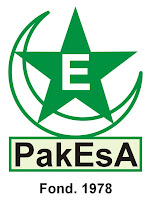Prefikso PRA-

PREFIKSO PRA-
(prefix-PRA) PRA The prefix indicates the degree of kinship immediate upward or downward or something primitive, remote.
1. Kiu povas nomi tri bestojn, kiuj en praarbaro alive? (Who can say the name three animals that live in the virgin forest?)
2. Tie Ci sin ballads of her tomboj miaj avoj kaj praavoj. (Here are the graves of my grandparents and great-grandparents.)
3. Ili estis praavoj kaj estis baldaŭ festontaj sian oran edziĝon. (They were grandparents and would soon be celebrating their golden wedding anniversary.)
4. Miaj prapatroj ne CIAM estis tre ĝentilaj. (My ancestors were not always so kind.)
5. Ekde it pratempo, laboro ekzistas. (From prehistory to work there.)
Warning:
If we double this prefix-PRA,
we have: = Prapravo great great grandfather;
prapranepo = trisneto.
Please be careful to pronounce the two pa twinned, quite distinctly.
"Father of the father" and "son of the son", ie
"grandfather" and "grandson",
and grandfather are said Nepo, therefore,
prapatro means "father for many generations,"
usually the trunk of the family (are ancestors).
Prefikso MIS-
PREFIKSO PRA-
(prefix-PRA) PRA The prefix indicates the degree of kinship immediate upward or downward or something primitive, remote.
1. Kiu povas nomi tri bestojn, kiuj en praarbaro alive? (Who can say the name three animals that live in the virgin forest?)
2. Tie Ci sin ballads of her tomboj miaj avoj kaj praavoj. (Here are the graves of my grandparents and great-grandparents.)
3. Ili estis praavoj kaj estis baldaŭ festontaj sian oran edziĝon. (They were grandparents and would soon be celebrating their golden wedding anniversary.)
4. Miaj prapatroj ne CIAM estis tre ĝentilaj. (My ancestors were not always so kind.)
5. Ekde it pratempo, laboro ekzistas. (From prehistory to work there.)
Warning:
If we double this prefix-PRA,
we have: = Prapravo great great grandfather;
prapranepo = trisneto.
Please be careful to pronounce the two pa twinned, quite distinctly.
If we double this prefix-PRA,
we have: = Prapravo great great grandfather;
prapranepo = trisneto.
Please be careful to pronounce the two pa twinned, quite distinctly.
"Father of the father" and "son of the son", ie
"grandfather" and "grandson",
and grandfather are said Nepo, therefore,
prapatro means "father for many generations,"
usually the trunk of the family (are ancestors).
"grandfather" and "grandson",
and grandfather are said Nepo, therefore,
prapatro means "father for many generations,"
usually the trunk of the family (are ancestors).
PREFIKSO MIS
(prefix mis) - indicates something misunderstanding, wrong, bad, inaccurate or false.

GE PREFIKSO
(prefix ge) - indicates both sexes. It is employed with the words of living beings or neutral words when you want to add the meaning of both sexes. The word is commonly formed in plural.
1. Peter, Martha Elizabeth kaj these miaj gefratoj. (Peter, Martha and Elizabeth are his brothers.)
2. Miaj gefratoj these bogefratoj mia edzino. (My brothers are my wife's in-laws.)
3. La geinfanoj ludas en la Parko. (Children play in the park.)
4. En nia urbo ekzistas tri gelernejoj. (In our town there are three schools for children of both sexes.)

SUFIKSO-EC-
(suffix-ec-)
Shows the abstract idea of a quality or a state.
-EC- also form adjectives in-eca with a sense of "similar to the nature of the same, the same look."
1. La ruĝeco of ŝiaj vangoj malkaŝis siajn sentojn. (The flush of her cheeks revealed her feelings.)
2. Lia heroeco plaĉis al tre itself. (Heroism him very pleased with it.)
3. Li Bonan edukitecon Havas. (He has good manners.)
4. Ni Havas amikecajn rilatojn kun ili. (We have friendly relations with them.)
5. Ŝtoneca koro (heart of stone)
Be careful not to confuse with ec and aĵ . The suffix aĵ indicates a "thing," something more or less concrete. For example, dolĉeco (sweetness) and dolĉaĵo (a sweet); Brazil Network tre these rich, Gia riĉeco these grandega, these kafo la unu el ĝiaj Plej grandaj riĉaĵoj. (Brazil is very rich, his wealth is immense, coffee is one of its greatest assets.)
Sufikso -AR-

GE PREFIKSO
(prefix ge) - indicates both sexes. It is employed with the words of living beings or neutral words when you want to add the meaning of both sexes. The word is commonly formed in plural.
1. Peter, Martha Elizabeth kaj these miaj gefratoj. (Peter, Martha and Elizabeth are his brothers.)
2. Miaj gefratoj these bogefratoj mia edzino. (My brothers are my wife's in-laws.)
3. La geinfanoj ludas en la Parko. (Children play in the park.)
4. En nia urbo ekzistas tri gelernejoj. (In our town there are three schools for children of both sexes.)
SUFIKSO-EC-
(suffix-ec-)
Shows the abstract idea of a quality or a state.
-EC- also form adjectives in-eca with a sense of "similar to the nature of the same, the same look."
1. La ruĝeco of ŝiaj vangoj malkaŝis siajn sentojn. (The flush of her cheeks revealed her feelings.)
2. Lia heroeco plaĉis al tre itself. (Heroism him very pleased with it.)
3. Li Bonan edukitecon Havas. (He has good manners.)
4. Ni Havas amikecajn rilatojn kun ili. (We have friendly relations with them.)
5. Ŝtoneca koro (heart of stone)
Be careful not to confuse with ec and aĵ . The suffix aĵ indicates a "thing," something more or less concrete. For example, dolĉeco (sweetness) and dolĉaĵo (a sweet); Brazil Network tre these rich, Gia riĉeco these grandega, these kafo la unu el ĝiaj Plej grandaj riĉaĵoj. (Brazil is very rich, his wealth is immense, coffee is one of its greatest assets.)
Sufikso -AR-
http://gramatikero.blogspot.fr/
http://gramatikero.blogspot.fr/?view=classic
http://gramatikero.blogspot.fr/?view=classic

